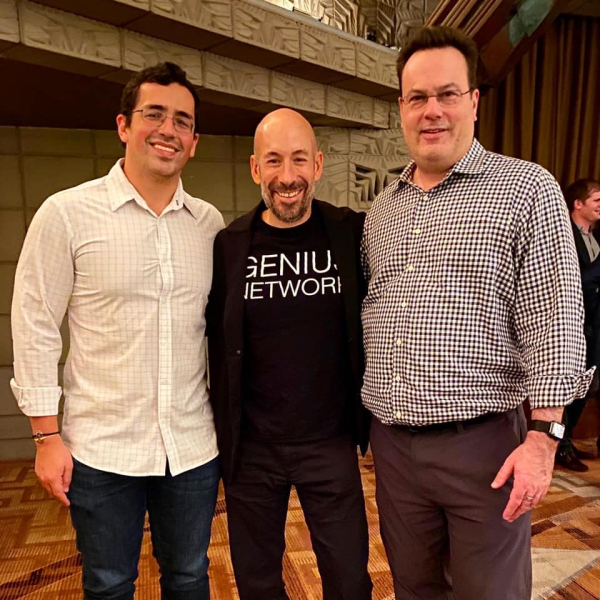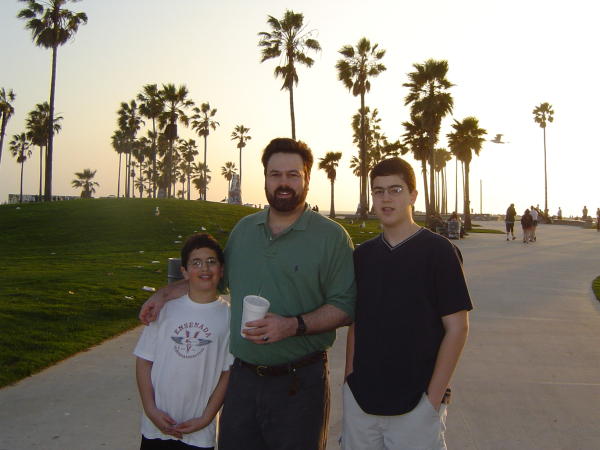I think about investments a lot ... which makes sense given my profession.
Yet, there are three key investments I think are more important than any monetary investment you can make.
The first is in yourself - in your physical and mental health. I recently spent a whole month introducing my approach.
Physical and mental health was a major topic at last weekend's Genius Network Annual Event in Arizona. I enjoyed listening to speakers like Peter Diamandis, Andrew Weil, Christopher Voss, and Dave Asprey - which brings me to key investment #2.
Find Your Genius Network
"You are the averrage of the five people you spend the most time with." - Jim Rohn
I have always believed that you can predict a lot about your future, based on the quality of the people you spend the present with. That is why I think participation in quality peer groups is critical. Peer groups help us set higher standards for our behavior, help us aim higher in our aspirations, and they help us stay better focused and committed to big-picture goals.
I belong to several executive and business leader peer groups like Genius Network, EO or Strategic Coach—groups that double as advisory boards, counselor’s offices, and idea factories. They allow me to see, hear, and discuss things I don't normally think about, talk about, or even notice. Peer groups bring blind spots to my attention and keep me fully connected to trends that are transforming industry on a global scale.
I've gained partners, life-long friends, and ideas that will last a lifetime. I've also started taking my son, Zach, to these events so he can get a headstart.

Dan Sullivan, founder of Strategic Coach, met my son and proclaimed "The book reader!"
Good memory.
Which brings me to my third key investment - and the one I'm most proud of.
Spread The Wealth
It is not enough to have a good mind; the main thing is to use it well. -Rene Descartes
Like many parents, I wanted to teach my children that, to a large extent, they control what happens to them. One of the first ways I did that was to set up a "game" for them to earn video games. Some parents try to limit the amount of time their kids spend watching TV or playing video games. Instead, my kids earned their games by reading books. Here is a photo from way back then.

Paid With Play.
Here's how it worked. Every 10 books earned them a video game, and every 100 books earned them a video game console. When they finished a book, it was their right, and my obligation, to take them to the bookstore for us to pick up the next book together. Likewise, when they finished the requisite number of books, it was their right, and my obligation, to take them to the computer store (does anyone remember CompUSA?) for them to choose whatever game (or console) their heart desired.
How Can You Encourage a Jump to the Next Level?
“Don’t just read the easy stuff. You may be entertained by it, but you will never grow from it.” – Jim Rohn
There came a point when I wanted one of my sons to start reading grown-up books. He was comfortable reading a certain type of book, and didn't want to read the kind of books that I read. So, I created a bonus system that counted a particular book as three books. I didn't force him; I just let the easier path to a reward "whisper" in his ear what to read. Once he finished that, he never went back to teen fiction.
It's a great way to learn about your kids.
I used the bookstore to get a sense of how the boys were doing. For example, I might say "I notice that you read five books in that series, maybe you'd like this book". Or, "That sure is a lot of science fiction; what was the last biography you read?" For the most part, though, I didn't care what they read. The key was to get them to want to choose certain books for their own reasons. Ultimately, their preference meant they were learning to love reading - and once you love reading, you'll eventually branch out on your own.
It Puts Them In Control of Their Destiny and Rewards.
My younger son likes competition. He also broke or misplaced many things. So, in order to earn back the Game Boy unit that he lost, I challenged him to read five books in five days. These weren't easy books either. It was designed to stretch him, and also to teach him that he could read a book a night. The bet was that he either finished all the books in the allocated time, or none of them counted towards games or Game Boys. On the other hand, if he read a book a night for two weeks, not only would he get to have his Game Boy back, the books would count towards a game too. It worked like a charm, and we were both happy.
So, Who Got the Better Bargain?
To end the game, as they entered their teenage years, I upped the ante a little. 500 books meant they got a laptop of their choice and had beaten the system. Both boys cashed in ... and probably felt like they were taking advantage of their dad. I got what I wanted, though; my boys love reading, and I was able to teach them two key ideals.
- The secret to growth is to constantly challenge yourself
- You can accomplish anything you put your mind to … one step at a time.
That is an investment that pays dividends for a long time.
Leveraging Astrology: Millennials Need To Be Stopped
Millennials ruin everything. I don't really believe that ... but it feels so good to type – and the following two stories make it sound true.
Trading is more accessible than ever before. We've gone from scrums of traders in trading pits to armchair experts investing in real estate, cryptocurrencies, options, and more from the comfort of their couch in their underwear.
With accessibility often comes misuse. Here are a couple of examples.
Infinite Leverage Glitch on Robinhood
Robinhood, which launched in 2013, has been a pioneer in app-based commission-free investing. While based on a solid mission of democratizing the financial system, it has also created an opportunity for "kids" to abuse the system.
The most recent glitch allowed Robinhood Gold users to abuse the allowed 2:1 Margin. Robinhood incorrectly counted the stock price and the option value as account value, raising margin limits. Users would sell puts and take in option premiums, use that to buy more shares of that stock, and then sell puts against those shares, Ad Infinitum. So, with a couple thousand dollars of risk, a user could take millions of dollars of risk.
The speculators at r/WallStreetBets famously used the glitch (which has been around since January) to lose massive amounts of money.
Here's a video of a man opening his Robinhood account to record the effect of the market open on his AAPL puts. If you look at his total return you can watch it go from 0.00 to -47K in an instant.
ControlTheNarrative via MetraMan09
Here's an album of a user's account with $1M in equity from $4K in cash by levering Ford shares. If you scroll to the end you'll see him with -$368,735.19 in buying power.
If they wanted a safer investment, they could have gone to Robinhood's bug bounty program and netted a cool $25k. Oh well, who needs risk management?
"Mercury Is In Retrograde ... Should I Sell My Stocks?"
My son brought to my attention a new iPhone app - Bull and Moon; "Find stocks whose stars align with yours".
Human Mel via Twitter
After you create your "astrological investor profile" their "proprietary financial astrology algorithm recommends an optimal portfolio of six stocks, and shows your compatibility score with thousands more."
Bull and Moon via Zach Getson
It's fun to hear about things like the Big Mac Index or the Super Bowl Indicator ... but this seems pretty out there.
The picks were pedestrian: Oracle, Hasbro, American International Group, Microsoft, Yum! Brands, and FedEx.
The logic and commentary were entertaining. The choices were based on "similarities in business decisions," "shared outlooks on humanity," and "strong mutual success metrics."
My favorite excerpt is
At least it's entertaining ... but I don't think it constitutes an edge.
And as the last note to the millennials behind these two great travesties...
Posted at 07:05 PM in Business, Current Affairs, Market Commentary, Trading, Trading Tools, Web/Tech | Permalink | Comments (2)
Reblog (0)